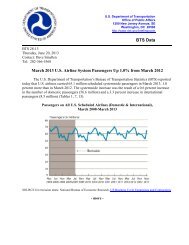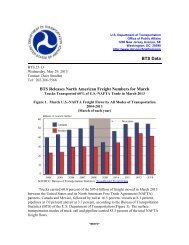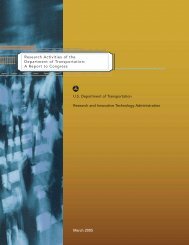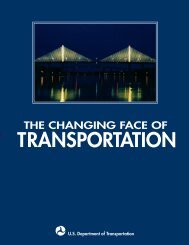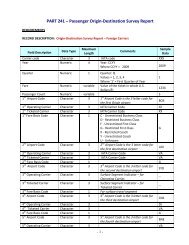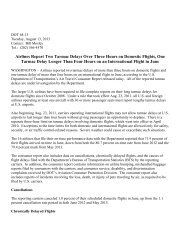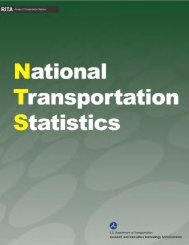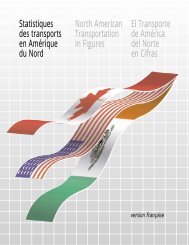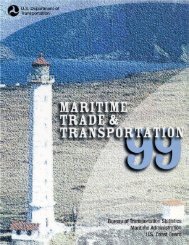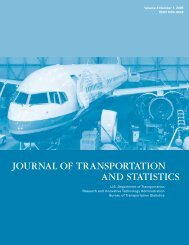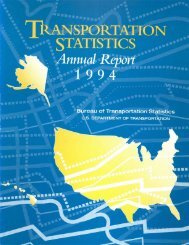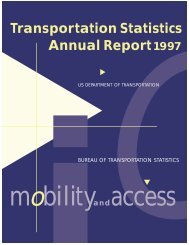table of contents - Research and Innovative Technology ...
table of contents - Research and Innovative Technology ...
table of contents - Research and Innovative Technology ...
You also want an ePaper? Increase the reach of your titles
YUMPU automatically turns print PDFs into web optimized ePapers that Google loves.
federal funds spent on transit, rail, <strong>and</strong> water<br />
transportation decreased while air transportation’s<br />
proportion <strong>of</strong> federal funding increased<br />
over this period. Highway spending increased<br />
slightly.<br />
State <strong>and</strong> local government spending priorities<br />
changed less <strong>and</strong> in a different way. Most<br />
notably state <strong>and</strong> local governments spent a<br />
slightly smaller proportion <strong>of</strong> funds on highways<br />
in 1992 than in 1982 <strong>and</strong> a slightly greater proportion<br />
on transit.<br />
Chapter 2 Transportation <strong>and</strong> the Economy � 53<br />
BOX 2-2: U.S. DEPARTMENT OF TRANSPORTATION 1994 BUDGET<br />
The U.S. Department <strong>of</strong> Transportation (DOT) outlays increased by 13 percent in real terms between 1984 <strong>and</strong><br />
1994, to a total <strong>of</strong> $34.8 billion in current dollars. The Federal Highway Administration accounts for the largest share<br />
<strong>of</strong> DOT outlays, spending 55 percent <strong>of</strong> the budget in 1994 compared with 48 percent in 1984. The other large<br />
administrations are the Federal Aviation Administration (FAA), which received 25 percent <strong>of</strong> outlays, <strong>and</strong> the Federal<br />
Transit Administration (FTA), at 11 percent. FAA outlays increased by 67 percent, <strong>and</strong> U.S. Coast Guard outlays<br />
increased by 23 percent in real terms between 1984 <strong>and</strong> 1994. The outlays <strong>of</strong> FTA, the Maritime Administration, <strong>and</strong><br />
the National Highway Traffic Safety Administration, however, decreased in real terms over this period. Federal Railroad<br />
Administration outlays fell the most—76 percent in real terms between 1984 <strong>and</strong> 1994 (see <strong>table</strong>).<br />
SOURCE: Volpe National Transportation Systems Center data.<br />
DEPARTMENT OF TRANSPORTATION OUTLAYS, 1984 AND 1994<br />
(IN MILLIONS OF CONSTANT 1987 DOLLARS)<br />
Modal Administration 1984 1984 (percent) 1994 1994 (percent) Percentage change<br />
Federal Highway Administration $11,255 47.7% $14,712 55.2% 30.7%<br />
Federal Aviation Administration 4,067 17.2 6,783 25.4 66.8<br />
Federal Transit Administration 4,024 17.0 2,926 11.0 –27.3<br />
Federal Railroad Administration 2,665 11.3 643 2.4 –75.9<br />
U.S. Coast Guard 749 3.2 920 3.5 22.8<br />
Maritime Administration 540 2.3 393 1.5 –27.2<br />
National Highway Traffic Safety Administration 211 0.9 201 0.8 –4.7<br />
All other DOT organizations 109 0.5 81 0.3 –25.7<br />
Total $23,620 100.0% $26,659 100.0% 12.9%<br />
SOURCES: 1984—U.S. Department <strong>of</strong> Transportation, Office <strong>of</strong> Economics, Assistant Secretary for Policy <strong>and</strong> International Affairs, Federal Transportation<br />
Financial Statistics (Washington, DC: various years). 1994—U.S. Department <strong>of</strong> Transportation, Bureau <strong>of</strong> Transportation Statistics, Federal Transportation<br />
Financial Statistics, prepared by Volpe National Transportation Systems Center (Washington, DC: in press).<br />
� Government Revenues<br />
Revenues collected by government for transportation<br />
purposes fall into three categories:<br />
� general tax receipts including income, property,<br />
<strong>and</strong> sales taxes;<br />
� special user taxes, such as the airport tax <strong>and</strong><br />
gas tax, placed in trust funds separate from<br />
general tax receipts; <strong>and</strong><br />
� user fees, such as road <strong>and</strong> bridge tolls.



